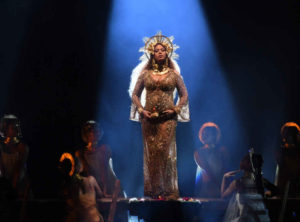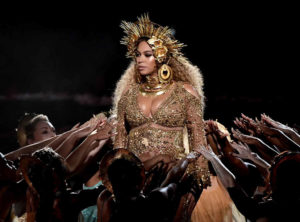This post stems from the lowest of lows in public discourse – a trivial social media disagreement about a pop culture topic.

Specifically, a group of nice, middle-aged white ladies (yes, I’m the pot with the kettle in this story) criticizing how “full of herself” Beyoncé was during the “spectacle” of her Grammys performance.
I don’t know much about Beyoncé. I’m generally dismissive of pop culture artists since they are often just corporations in disguise. I don’t listen to much pop.
I watched the Grammys from my sick bed while recovering from the flu and goofing around online.

Beyoncé’s performance mesmerized me.
Visually stunning, it was not based on the usual shock-factor or hyper-sexuality that dominates so much of pop star women’s performances. Rather, it seemed to be exalting the love between mothers and daughters, Black mothers and daughters, to sacred status.

At one point Beyoncé said,
“If we’re going to heal, let it be glorious/ One thousand girls raise their arms.”

Quite a powerful statement given how much healing we’re yearning for in this political climate, and how girls and women are leading the march towards healing in unprecedented ways.

I googled Beyoncé’s words and learned that they came from the Somali-British poet Warsan Shire, whom Beyoncé collaborated with to make her Lemonade album.
Shire also wrote the devastating poem “Home” about the refugee experience, which begins:
“no one leaves home unless/home is the mouth of a shark”
Please read the whole poem. Read it now.
It turns out that in addition to being “full of herself,” Beyoncé was using her platform to highlight a voice that needs to be heard, a story that needs to be told.
Which brings me to the point of my post:
These days the battle between love and hate has been pushed to the forefront in a way I have not seen (noticed) in my lifetime. As one of those nice, middle aged white ladies, I am not confronted with hatred often – I get to observe it from the safety of my couch while watching the news. Even so, I can plainly see that hatred (toward refugees, people of color, anyone made to live on the margins of society) is more out in the open, but love is too.
I appreciate artists using their medium to elevate love to its sacred status.
Let’s appreciate the voice of love when we see it – especially if it takes us out of our comfort zone.
It’s easy to say that we stand for love, just like it is easy for some people to go to church and think they’ve done their weekly work for God. But standing for love and being close to God is not meant to be easy.
Living our lives as embodied love is elusive. You can work at it for years, studying the great spiritual leaders of your faith, doing the psychological uncovering of your ego and yet still be withholding love in countless ways – from your too-loud neighbors, or from a community of people in your own town who are struggling in ways you’re blind to, or even from your own child who is working your very last nerve.
We each withhold love in various ways each day and that is what separates us from the Divine. Moving closer to God means moving closer to fully embodying love in our daily lives.
What if our love for others was as bright and bold as Beyoncé’s headdress?

We have arrived in an era when hate speech and love speech are more out in the open than has been the case for awhile.
If you are on the side of love, it’s time to be fully love, full of love, full of yourself as love. Anything less is to comply with the hate that surrounds you.
And white readers, if we are turned off by something that a black or brown person is doing, let’s think long and hard before using “they are full of themselves” as a proclamation of our distaste.
If we are on the side of love, we strive for everyone – especially those who have blatant hatred directed at them just for existing – to be fully themselves.
Photo Credits
Courtesy of Beyoncé/eonline.com
beyonce-en-deesse-solaire-a-la-ceremonie-des-grammy-awards-2017_230698_w696[1].jpg
Matt Sayles/Invision/AP
Kevin Winter/Getty Images for NARAS/eonline.com
Womens March in Providence, RI (AP ) NYTCREDIT: Sait Serkan Gurbuz/Associated Press






